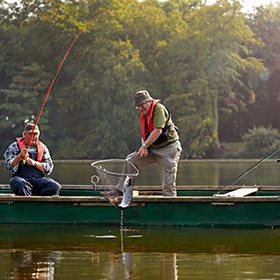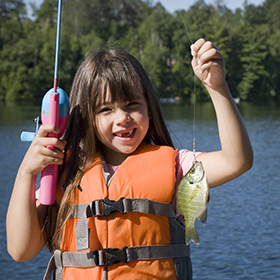Sometimes anglers fish too quickly. Beginning anglers may rush because of lack of patience; advanced anglers may rush due to over confidence. If fish don’t hit immediately, or within a perceived strike zone, many anglers race the lure back to cast again.
Sometimes anglers fish too quickly. Beginning anglers may rush because of lack of patience; advanced anglers may rush due to over confidence. If fish don’t hit immediately, or within a perceived strike zone, many anglers race the lure back to cast again.
Many species of fish, freshwater or saltwater, will follow a lure or bait before deciding to strike or not. Be alert and give each cast a chance to tell you something.
If the fish are hitting near shore but you failed to attract a strike when reeling back, quickly stop the retrieve right at the boat. This abrupt drop, or one last twitch may draw a hit. Bassmaster Elite angler Byron Velvick believes “fish seem to sense the presence of the boat and realize this is their last chance.”
Another Elite angler, Brandon Palaniuk, uses the transition from deep to shallow water as a way to trigger bass to hit a crankbait before it “gets away.” If retrieving from shallow to deep, bass can follow and take their time, perhaps too much time, to decide if the lure is worthy of a hit.
With each cast, watch behind the lure. You may detect a dark image, or slight wake of a follower. If your eyes are already up, deciding on a target for the next cast, you may miss a chance at enticing that follower, or miss the swirl when you lift the lure from the water.
Even if you hook a fish and are reeling it in, watch behind that fish. Often, other fish follow this activity. A quick release or an observant fishing partner may be able to catch this “fired up” fish too.
Many species of fish, freshwater or saltwater, will follow a lure or bait before deciding to strike or not. Be alert and give each cast a chance to tell you something.
If the fish are hitting near shore but you failed to attract a strike when reeling back, quickly stop the retrieve right at the boat. This abrupt drop, or one last twitch may draw a hit. Bassmaster Elite angler Byron Velvick believes “fish seem to sense the presence of the boat and realize this is their last chance.”
Another Elite angler, Brandon Palaniuk, uses the transition from deep to shallow water as a way to trigger bass to hit a crankbait before it “gets away.” If retrieving from shallow to deep, bass can follow and take their time, perhaps too much time, to decide if the lure is worthy of a hit.
With each cast, watch behind the lure. You may detect a dark image, or slight wake of a follower. If your eyes are already up, deciding on a target for the next cast, you may miss a chance at enticing that follower, or miss the swirl when you lift the lure from the water.
Even if you hook a fish and are reeling it in, watch behind that fish. Often, other fish follow this activity. A quick release or an observant fishing partner may be able to catch this “fired up” fish too.









